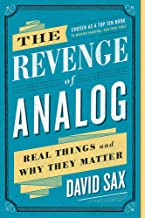The Revenge of Analog
Posted on 12/06/2019 in misc

In The Revenge of Analog author David Sax surveys a variety of businesses that were supposed to be dead by now.
-
Vinyl records? Sales are growing. They aren’t going to become a major force in music distribution, but it’s a significant niche with real businesses creating real jobs.
-
Camera Film? Growing. Poloroid film is back to over 50% of where it was in 2008 when Poloroid quit. 40 million unit sales of anything is a significant business market.
-
Notebooks? Moleskin is as popular as ever. It debuted the same year as Palm Pilot. Which one is easier to find in a store today?
Ironically, I read this book on a Kindle :) I also highlighted 45 passages. One thing that struck me was how many of the themes of this book I have written about previously, in most cases well before this book was published.
All digital music listeners are equal. Acquisition is painless. Taste is irrelevant. It is pointless to boast about your iTunes collection, or the quality of your playlists on a streaming service.
I covered this in 2011 in The Lost Art of Curation.
Digital photography actively discourages the physical artifact of a photograph.
A magazine has a defined beginning, middle, and end, and reaching that end is incredibly satisfying. “We sell the feeling of being smarter when you get to the end.
From last year, The Internet Needs to End
As much as we believe that limitless selection is desirable, we actually crave limits as shoppers
I mean, I even wrote about my return to a more analog lifestyle, where I specifically made this point.
Digital technology has proven very good at creating two types of jobs: high-paying, highly specialized jobs at the top (such as software designers and CEOs), and low-paying, low-skill jobs at the bottom (such as Foxconn phone assemblers and Amazon warehouse fulfillers). The result is an economy of increasing inequality.
I had not really considered the idea that the digital economy I work in might be in part to blame for increasing inequity.
Even the best educational computer programs and games, devised with the help of the best educators, contain a tiny fraction of the outcomes of a single child equipped with a crayon and paper.
I’m not a luddite. I see a lot of applications for digital technology in education. But digital tools are just that. Tools. Tools don’t solve problems. People do. And the people in the education system that we need to value are the teachers.
For each gain that digital technology delivers (speed, broad connectivity, vast processing power) it sacrifices something analog (quiet, personal connections, contemplative thought).
And I think we are learning that in many cases, our assumptions that the gains were worth it might not be valid.
So, two takeaways from this.
- Great book.
- You people should be paying attention to what I write :)